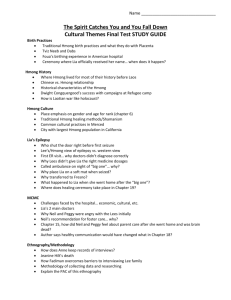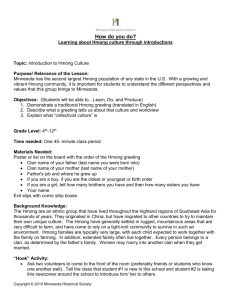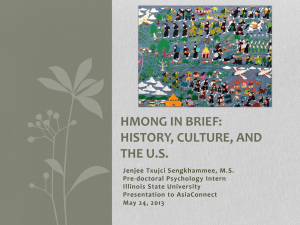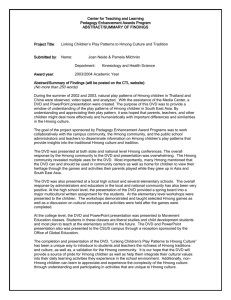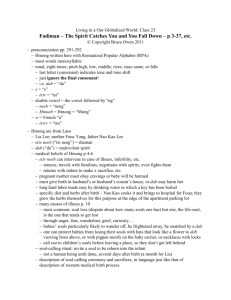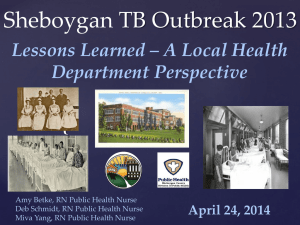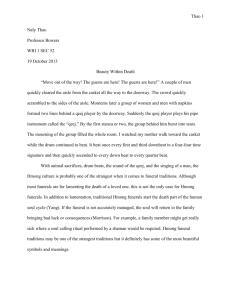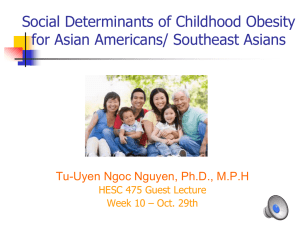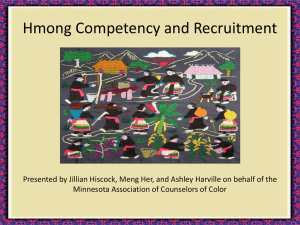Milwaukee Consortium for Hmong Health
advertisement
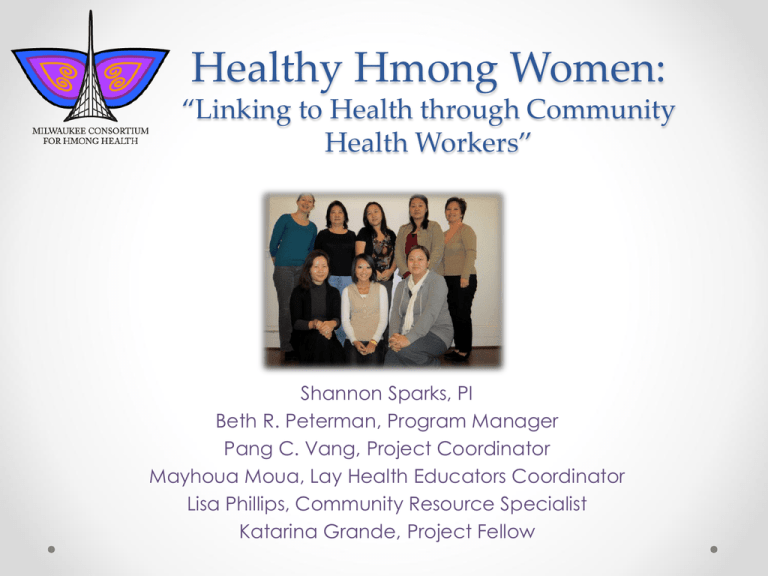
Healthy Hmong Women: “Linking to Health through Community Health Workers” Shannon Sparks, PI Beth R. Peterman, Program Manager Pang C. Vang, Project Coordinator Mayhoua Moua, Lay Health Educators Coordinator Lisa Phillips, Community Resource Specialist Katarina Grande, Project Fellow Goal: Increase awareness of the cancer disparity issues affecting the Hmong community and share a promising outreach and education strategy Objectives: 1. Describe the rationale for cancer despair work in the Hmong community 2. Elaborate on Milwaukee Consortium for Hmong Health (MCHH) community health worker project Healthy Hmong Women Project background Goal: To increase rates of breast and cervical cancer screening and reduce cancer morbidity and mortality among Milwaukee Hmong women through development and implementation of culturally‐appropriate lay health education and peer navigation programs Anecdotal Data • Young Hmong women in Milwaukee are having & dying of evasive cervical cancer • A Milwaukee Hmong woman committing suicide because of a diagnosis of cervical cancer • It is rare for Hmong women to survive cervical cancer (myth) • Chemotherapy lessened a woman’s survivor rate for breast cancer (myth) • No supportive Hmong cancer survivor service RESULTS Reason for NOT having a Pap test n=99 Percent Never heard of Pap smear 38% No reason or never thought about it 24% Did not know that I needed this test 12% Never had any problems 9% Other 16% Focus Groups/Community Discussions • Belief in going to see doctor only when necessary. o “I used to go to get exams when I was pregnant. My youngest son is 16 years. So, that means I have not gone in to see a doctor for 16 years.” • Fear of doctors. o “I don’t go in for exams because I fear knowing the truth.” o “My relatives and I are afraid of going in to see the doctor. We don’t want to find out anything negative, so it is better to not go unless we are sick.” • Lack of knowledge about importance of screening • Time Why choose community health workers/lay health educators model? Healthy Hmong Women The Community Health Workers Healthy Hmong Women Curriculum • Session 1: Introduction to Community Health Workers and cultural competency • Session 2: Mental health and ethical issues • Session 3: Communication skills, resources and referrals • Session 4: Breast Cancer Conference for Community Health Workers • Session 5: Breast and cervical cancer • Session 6: Let’s practice! Teaching breast and cervical cancer • Post-training celebration Healthy Hmong Women Training Methods • • • • Many guest lecturers with content expertise Interactive Discussion-focused Parts of training in English, parts in Hmong Healthy Hmong Women Outcomes • Successes o Outreach • >5 events/conferences o Group Sessions • 66 participants • 8 educational sessions Healthy Hmong Women Outcomes • Outreach example: 2012 Hmong New Year o Outreached to >100 people Healthy Hmong Women Outcomes • Website o Project info o Hmong health resources o Link to community events Milwaukee Consortium for Hmong Health Outcomes • Reports – Will be made available on website within this year Healthy Hmong Women Project Challenges • • • • • Recruitment of survivors High turnover rate of the CHWs Case Management problems Communication issues The CHW Training requirement Acknowledgments * Funding for this project was provided by the UW School of Medicine and Public Health from the Wisconsin Partnership Program. Additional support are provided by the • Collaborative Center for Health Equity, UW-ICTR (CCHE) • Wisconsin Wellwoman Program Consortium Members • • • • • • • • • • • • ABCD: After Breast Cancer Diagnosis American Cancer Society Chronic Disease Prevention and Health Promotion Division of Public Health City of Milwaukee Health Department Breast and Cervical Cancer Awareness Program Hmong American Women’s Association Lee Medical Clinic Southeast Wisconsin Affiliate of Susan G. Komen for the Cure® United Healthcare Community Plan UW-Madison, Department of Human Development & Family Studies (HDFS) UW-Milwaukee House of Peace Community Nursing Center WI Dept of Health and Family Services Yer M. Xiong, MD, MPH

